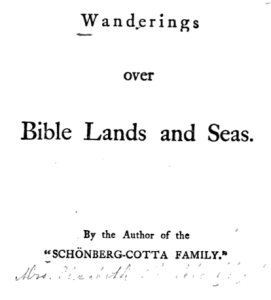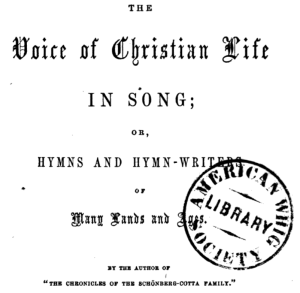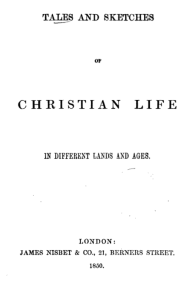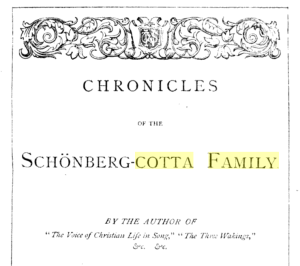I have been reading Spurgeon’s Treasury of David, his lengthy commentary on the Psalms. After several pages of his own commentary, he includes with each Psalm a lengthy section of quotations from older commentators. Spurgeon’s thoughts are generally helpful, but I especially enjoy reading these other references.
On Psalm 59:14 he quotes a book by title without naming the author. The quotation has to do with Englishmen viewing dogs in a more positive light than they were viewed in the culture of Psalm 59. The book is Wanderings Over Bible Lands and Seas. I was puzzled why he didn’t name the author, so I found a facsimile of the book online and discovered that the author is not named on the title page. It says instead “by the author of The Chronicles of the Schönberg-Cotta Family.”

I was curious enough to play historian for a few minutes and explore. This blog is a record of those explorations.
This book The Chronicles of the Schönberg-Cotta Family is the author’s most famous and is a fictional novel about Martin Luther. Among other things, it is the source of a quotation widely but falsely attributed to Martin Luther himself. This book is also easily found online, where the author is listed as “by the author of ‘The Voice of Christian Life in Song,’ ‘The three wakings,’ etc.”
I also found The Voice of Christian Life in Song online, where the title page says, “by the author of The Chronicles of the Schönberg-Cotta Family.”

This is getting us nowhere. The references are circular; either this author is a time traveler, or one of these is a later reprint. The Chronicles was published in 1862. Sure enough, The Voice predates it, the earliest copy online is 1858. The copy above is from an 1865 reprint, after the Chronicles had become well known.
Checking that older edition, the title page attributes it to the author of Tales and Sketches of Christian Life. This too can be found online, leading me to pause and express appreciation for the work that has gone into scanning so many old books. This book, apparently the author’s first, was published in 1850 anonymously with no author.

Her name finally shows up in 1893 on a book titled Early Christian Missions of Ireland, Scotland, and England as Mrs. Rundle Charles. There a subtitle names her as the author of The Chronicles, confirming her authorship of the entire chain of references. Rundle is her maiden name and Charles her married name; she omits her first name. She was born in 1828 as Elizabeth Charles to a well-known politician John Rundle. She wrote Tales, her first book that I know of, at age 22 while still single. She married Andrew Paton Charles in 1851 and died in 1896. She is listed in the Encyclopedia Britannica and the Oxford Dictionary of National Biography.
Spurgeon’s Treasury of David predates this later book by several years. I don’t know if Spurgeon was unaware of her identity, or if he wanted to respect her desire for anonymity. Some might suspect that Spurgeon was hiding her identity as a woman, in line with the cultural influences that may have encouraged her to write anonymously to begin with. However, I don’t think this is the case. Spurgeon does quote women by name, for example Psalm 61:1 where he quotes a Mary B. M. Duncan. Spurgeon was emphatically against women preaching, but had a Sunday School teacher, Lavinia Bartlett, who he reportedly often referred to as “my best deacon.” In a sermon on Romans 10:14-15 he said, “Now, tonight, I wish that I could stir up everyone here to become a preacher, women and all; not that I care much for women preaching, but I want them to preach in the sense in which I have laid the matter down; that is, to make known to somebody the wondrous story of the cross. Speak to an individual, if you can. If you cannot do that, write. If you cannot write, send a sermon, or give a tract. Only do keep on making Christ known.” If he were opposed to her efforts to write, I doubt he would have quoted her to begin with.
We get a taste of her spirit and motives in writing from the preface to that first book, Tales. She wrote, “in writing this little book, I have not felt as if addressing strangers, much less that grave tribunal conjured up by the phrase ‘the public;’ but simply as if speaking to my friends, and the members of my own family, one by one, of the things we love best. To them I now offer it.”
A remarkable lady! One of many who served Christ in their generation and are now largely forgotten. She is also known for several original and many translated hymn texts. I will end with the opening line of her hymn text, Around a Table, Not a Tomb:
Around a table, not a tomb,
He willed our gathering place to be,
When, going to prepare our home,
Our Savior said, “Remember Me.”
P.S. There is some controversy about the authorship of this poem, because it appears in an 1888 American hymnal titled Songs of Pilgrimage under the name Lydia Huntley Sigourney, a famous American poet who died in 1865. The lengthy introduction to this hymnal, by the way, is fascinating reading; you can find it online. This is the only source I can find attributing it to Sigourney, however. Numerous publications credit Charles with the text, probably because it appears in her collection of Poems titled Songs Old And New published in 1862. The title might suggest that some of the poems are not original. None of them have authors listed, but some of them, including this one, have dates, suggesting they are original.

